Basic training for new recruits meant the left-right-left-right monotony of parade-ground drilling, relieved by occasional route marches. And fatigue duties. And guard duty. And lectures. Private Otto Kirkby of C Bearer Section kept a meticulous record of each day’s proceedings in his diary. Monday to Friday came to mean: “Usual drills and Lectures”, “squad drill & stretcher drill.” Saturdays meant “Tent Drill.” Sundays were a blessed day off.
On September 13th Jack wrote to his mother: “Just a line to let you know that we are still in camp yet.... I left you 4 shillings per day out of my pay... so you can take 2 shilling per day for yourself and put 2 shilling per day in the Bank for me for when I come home from the war. I will be having a good holiday.”
On the 30th Jack wrote home again: “Just a line to let you know we are still in camp. We are expecting to leave at any moment for the Old Country.” But this rumour proved to be premature. On Monday, October 5th Otto Kirkby noted: “Left camp 4.15 marched out 8 miles. Breakfast at Major Bessell Browns Farm. Marched 8 miles again. Dinner at Barrett Lennard vineyard. Message came out to come back to camp. Started 2 o’clock arrived back 7 o’clock. Altogether 32 miles. Record one days march for the camp.”
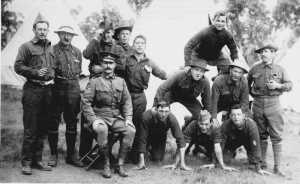
Jack with his mates of 3rd Field Ambulance at Blackboy Hill, 1914. From left to right: Back Row, Driver L.A. Denbigh; Pte. D.N. Cadoux; Pte. John Simpson Kirkpatrick, with hands on hat; Pte. F.C. Spurgeon; Pte. F.M. Gill; Driver W.H. Griffiths. Middle Row, Sgt-Major McBride; Pte. R.J. Hastings; Pte. J.W. Gillies; Pte. W.H. Baker (not Bert Baker). Front Row, kneeling, Pte. J Prately, L/Cpl. A.R. Davidson; Pte. L. Darcy. Donor, L.A. Denbigh. (Australian War Memorial A03117).
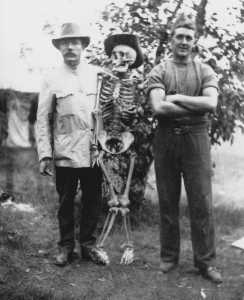
Jack the clown, with friend. Pte. Albert Currie, a Boer War veteran, is on the left. (Australian War Memorial A03116).
And the following day Kirkby, Jack and the rest of C Bearer Section went on a night march. “Left camp 7.30. Arrived 9.30.” On the 9th Kirkby recorded: “Fatigue Duty. Dig pit for refuse.” And on Sunday, October 11th: “Field (exercise) day with artillery collecting wounded.” And again, on the 13th: “Field day. Marched out 2 miles... practiced over a hill building Dressing Station etc.”
By the 14th Jack was confident that a move was imminent. He wrote telling Sarah and Annie: “My address when I get to England will be Private John Simpson (the first use of his new name), no 202 C Section, 3 Field Ambulance... I think we are going to Aldershot when we get to England. So I will be able to come and see you pretty often before we go to the front... so give my love to Annie and with love to yourselve... Your loving son, Jack.”
Jack had two close friends in 3 Field Ambulance in Andy Davidson and Bert Baker, and they have left vivid records of their Geordie mate so that we can see what kind of character he had become by this time.
Andy described Jack as “a big man and very muscular, though aged only 22 and was selected at once as a stretcher bearer... he was too human to be a parade ground soldier, and strongly disliked discipline; though not lazy he shirked the drudgery of ‘forming fours’, and other irksome military tasks.” Andy also said of Jack that “he was very witty, and inclined to the lazy, very popular, liked a pot or two but did not drink to excess; careless of dress and was a handful to Sgt. Hookway, his Section Sergeant.”
Bert described aspects of Jack’s character which tend to reinforce the image we get of Jack, which he presents of himself through his letters. This is of a responsible, self-assured to the point of brashness, hard-working, no-nonsense individual, who could be a bit hot-headed at times. Bert agreed that Jack was a man of the world, who’d been around a bit and could take care of himself. But, Bert added, he was also a man with a highly-developed sense of humour and devilment. Bert illustrated this with a number of stories; of him leading a “pirate raid” on his own ship in Mudros Harbour; his treatment of the Arab street-traders in Cairo; the Emden beer incident, and others (more of which later). Bert also explained why Jack was called Murphy by the soldiers at Anzac, those who didn’t know him. It all began at Blackboy Hill, with one of Jack’s mates, an Irishman called Maurice Mahney. Whenever Jack spoke to Mahney he put on an Irish accent, complete with “me boyo”, and “begorra and bejazus” and all the rest. Simpson carried on this Irish impersonation at Anzac to the point that the men there genuinely believed he was an Irishman, calling him “Murphy.”
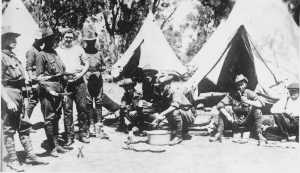
Some of the original members of 3rd Field Ambulance at Blackboy Hill Camp, WA, 1914. From left to right: Pte. A.J. Currie; L/Cpl. A.R. Davidson; Pte. W. Lindsay; Pte. John Simpson Kirkpatrick, with forage cap worn sideways on his head; Pte. F.J. Kennedy; Driver C. Mansfield; Pte. E.L. Langoulant; Pte. F.E. Meachem; Pte. J.C. Dinsdale; (Unknown). Donor, Mrs Sarah Simpson Kirkpatrick. (Australian War Memorial A02827).
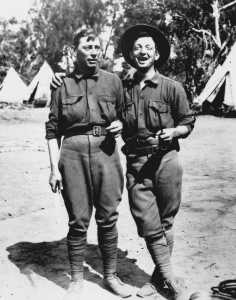
Some of Jack’s mates at Blackboy Hill. Privates John Prately (left) and Len Darcy. (Australian War Memorial A03354).
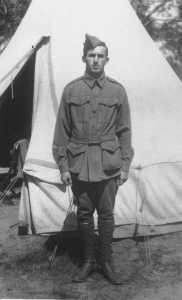
And Teddy Langoulant (Courtesy of Mrs Jan Hankinson and the Langoulant family).
One thing Bert was at pains to correct was the false picture put out about Simpson, by one later writer, of him being “a boozer and a brawler.” Bert shared a tent with Simmo at Blackboy Hill and Mena, and he went around the bazaars of Cairo with him. Bert stressed that during the nine months he knew him he had never on any occasion seen Simpson involved in any kind of fight. The brawler image seems to have originated on the basis of the Christmas Day stoush on board the Kooringa, in which the entire crew took part; and on Jack’s run-in with the drunken landlord in Corrimal (both of which Jack wrote home, describing to his family). Simmo couldn’t afford to be a boozer. Out of the five shillings a day pay he received in the army he kept a shilling, sending the rest home. Most of his shilling a day was spent on cigarettes and extra “grub” - leaving enough for a pot or two, but scarcely enough for serious “boozing”.
There was another side to Jack’s nature, however, which he made little or no mention of - but which Andy and Bert laid great emphasis upon. And that was Jack’s love of animals. “He was passionately fond of animals”, Andy wrote, “and always had a dog following him around -any dog he could pick up.” On another occasion Andy said of Simmo: “Soon after he entered camp he disclosed a passion for animals, which gave a clue to the peculiar form which his heroism was to take near the end of his short career.”
It was Bert who found the young possum at Blackboy Hill, abandoned or lost by its parents, which he showed to Jack and which Jack adopted, becoming its proxy “mother” from then on, feeding it and carrying it around with him tucked down inside his shirt front.
Bert summed up Simmo thus: “He was very popular. He was a man with a bit of humour, you know... said with a chortle ... he was man who wanted to work on his own, see... He was a hard doer and a most likeable man... I thought he was a wonderful bloke.” There was another thing which these three friends had in common. Andy and Bert would both be decorated for heroism. Indeed, they were decorated together, Andy with the Distinguished Conduct Medal (second only to the Victoria Cross) and Bert with the Military Medal, for the actions they performed between August 31st and September 2nd, 1916, at Mouquet Farm. Orders to move from Blackboy Hill eventually arrived at the end of October.
Jack and his mates sailed for Europe, on board the SS Medic, from King George’s Sound, on November 1st. One incident of particular note took place on the voyage, which Bert Baker later recalled. On the 9th of November the cruiser Sydney suddenly left the convoy and went steaming off at full speed, disappearing over the horizon. Then came the muffled sound of explosions. About four hours later, at 11.30 am in fact, during the beer parade according to Bert Baker, it was announced over the ship’s loudspeakers that the Sydney had sunk the German raider, the Emden. The men were allocated an extra pannikin of beer each, as a celebration - “and of course when they said ‘Oh the Emden’s sunk, Sydney sank the Emden’ and of course we left our beer and went up on deck to see if we could see anything, and Simpson stopped down and when we went back he was as full as a boot - ’cause he’d drunk all our beer.”
Jack had taken his possum with him aboard the Medic. It slept in his hammock while he slept on deck and the furry little animal seems to have been prone to go walkabout, as a familiar cry to all on board, in ringing Geordie tones became - “Where’s me bliddy possum!”
The convoy stopped off at Egypt instead of going on to Europe, as Turkey had entered the war on Germany’s side and the Suez Canal had to be protected against this new enemy. The Australians established a camp at Mena, about 16 kilometres from Cairo, near the pyramids; with the New Zealanders camped near by at Zeitoun. Jack wrote home on December 20th: “Just a line to let you know we arrived in Cairo last week the 12th. We were 42 days on the trip... you can see nothing but sand, sand, sand. We have got two pyramids about 300 yards from out tents... The grub in this camp is very bad. We have to buy nearly as much as we are given they would think they were feeding a lot of sparrows instead of hungry men.”
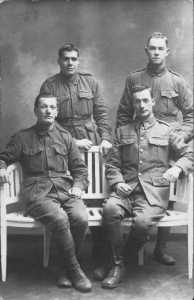
Some of Jack’s mates, photographed later in France. Standing: left, Bert Baker; right, Otto Kirkby. Front: left, unknown; right, Andy Davidson. (Courtesy of Jim Kirkby).
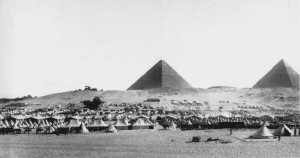
Part of the Mena camp, below the Pyramids. (Australian War Memorial A02741).
Jack was bitterly disappointed at missing out on a trip home. On December 25th he wrote to his mother: “It is Christmas Day I was looking forward to spending today in Shields but I was doomed to be disappointed. I would not have joined this contingent if I had known that they were not going to England. I would have taken a trip home and had a holiday at home then joined the army and went to the front instead of being stuck in this ungodly hole for all that you can see is sand and drill from morning to night and the grub is very poor and not half enough of it.”
Training picked up in tempo at Mena. Otto Kirkby recorded the “Usual Drill and Fatigues”, “ditto”, “went up to the pyramids”, “very dusty, terrible dust storm”, “night march”, “Drill, Stretcher, Company etc”, “practice loading wagons”, “Stretcher drill & Tent pitching”, “Fatigues, Guards, Route marching.” They marched out into the desert for miles, through the soft sand, carrying a full pack under a scorching sun. It was a gruelling ten weeks. But it was also part of “The Great Adventure”, in a most exotic setting. And it had its lighter moments. After every scorching, exhausting session there would appear, right out in the desert, as if from nowhere, Arabs selling them “Oringies, five one piastre”, and “Eggs-a-cook” (hard boiled eggs), and “Nessles chocolat, verra good, two piastre.”
Field exercises were a regular item on the agenda. On February 12th the men of 3 Field Ambulance marched out to El Kafra, where they set up a dressing station “amid a clump of date palms.” Three days later they took part in an attack by the Third Brigade, forming a dressing station “and collecting the wounded on the sandhills and bringing them in.”
3 Field Ambulance was a composite unit, made up of three sections, each of which consisted of a Bearer (and transport) Subdivision, of nine four-man stretcher-bearer squads (and wagon personnel) who carried the wounded to a dressing station. Here they were treated by the Tent Subdivision, which consisted of two doctors and twenty-six nursing-duty men. A Section had been raised in Queensland and B Section in South Australia. The Bearer Subdivision of C Section (Jack’s) had been raised in Western Australia, while the Tent Subdivision was made up of men from Tasmania. The men of the three sections only got to know each other when they arrived in Eygpt. There, according to Capt. Victor Conrick, Bearer Officer of A Section, “a splendid rivalry sprang up as to which section had the best bearers, best nursing-duty men, best transport etc.” In wartime the three sections often combined to form one larger dressing station.
On January 17th Jack had written to Annie, teasing her: “I see by your letter that you have turned down your sailor boy (Annie married her sailor boy, Francis Parkin, in 1918)... My word women are strange animals... they are very changeable... And he actually drunk beer, well he must be a brute.” Jack then asked Annie not to send him the watch she’d promised, as it would almost certainly go astray in the mail - “Keep it until I get home.... for it will be the first thing that I will ask you for when I get home which I don’t think will be long.”
And on the 30th Jack had written to his mother thanking her for the hamper she’d sent: “We had the loaves for tea at our mess table, the boys were full of praise for your loaves for I told them that you baked them yourself.”
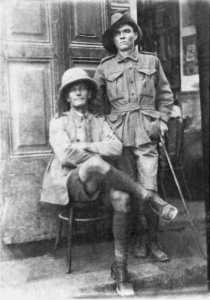
Jack’s mate Maurice Mahney (standing), photographed in Cairo. (Courtesy of Mrs Mari Millard).
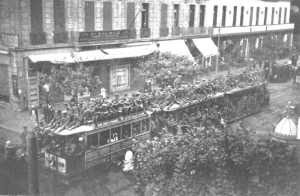
Australians coming into Cairo aboard the electric tramcars, ‘packed to overflowing’ (Phillip F. Schuler).
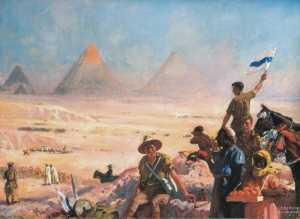
Training in the desert, Mena by George Benson and Frank Crozier, 1921. Oil on canvas 112x153cm (Australian War Memorial (ART03607))
On their days off Jack and his mates often went in to Cairo aboard one of the electric tramcars, which were usually packed to overflowing, with men on the roof and on the running board. There Jack could treat himself to a sumptuous meal. There also, according to Andy, he delighted the local girls in the cafes with his possum which he kept hidden down his shirt front. But the greatest entertainment in Cairo, according to Bert, was Jack’s treatment of the Arab street traders. One of the favourite ploys of these con-men was to offer a sample of their fruit or pastries to an unsuspecting tourist. Once accepted then of course would come the hard sell, with blandishments, entreaties, even threats - which the normal tourists usually succumbed to. Or else the tourist would be ensnared by a game of chance, the shell game etc, where he or she would be allowed to win the first game, to draw them in. Jack had a simple strategy with all these con-men. He accepted their samples, or the winnings of the first game - then strode off, with the surprised, then entreating, then threatening, then pleading Arabs following in his wake. Bert said it was a marvellous, hilarious sight to see, Jack walking along blissfully unconcerned, with all those pleading, frantic Arabs in tow.
At the end of February 1915 Jack had to leave his possum at the Zoo in Giza, as Bert Baker recalled. His unit was ordered to Lemnos, as part of the Third Brigade, for special training. It had been decided by Britain’s military leaders to launch an attack against Turkey by capturing the Gallipoli Peninsula, then Constantinople, thus forcing Turkey out of the war. This would relieve pressure on the Western Front in France, and if successful would shorten the war, in favour of the allies. The Third Brigade was to lead the invasion of Gallipoli.
Click here to see relevant maps
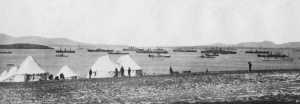
Tents of 3rd Field Ambulance Dressing Station at Mudros in 1915. (Courtesy of Phillip F. Schuler).
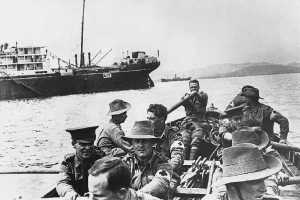
Field ambulancemen practising boat drill in Mudros Harbour, 1915. (Australian War Memorial C01932).
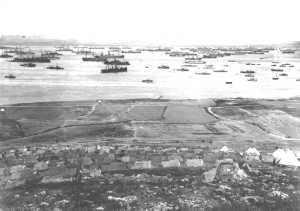
Port of Mudros Harbour just before the invasion. (Australian War Memorial G00547).
Their seven-weeks stay at Lemnos was a mixed time for the men of Jack’s unit. The island didn’t have enough water for the invasion force which eventually assembled there and the men had to live on board the ships. The weather was cold and windy most of the time, with frequent severe squalls or storms. Nevertheless, according to Andy, “we had a very happy time, and were so fit that nothing mattered.”
On March 9th the Tent Subdivision of C Section went ashore at Mudros (the capital of the island) and the Dressing Station tents were erected, giving the nursing-duty men practice from then on in treating sick patients (along with the Stationary Hospital which was subsequently established nearby).
Jack and the rest of the stretcher-bearer division (of A, B and C Sections) practised rowing ashore (when the weather wasn’t too rough). They also took part in boat races.
A sometime-carnival atmosphere prevailed during these rowing sessions, which scarcely anticipated an experience which lay ahead of them, in the not-too-distant future. Once ashore the men practised stretcher drill, or went on route marches around the island. L/Cpl. Andy Davidson was in charge of one of the boats. For his oarsmen Andy had Jack, John Gillies, Maurice Mahney and John Prately. Instead of rowing back to their ship they sometimes went on foraging expeditions for wine and some decent food from the local villages. “Simpson was at his best on any job like that”, Andy remembered. He also recalled a “pirate raid” Jack led on their own ship the Malda, while it was at anchor in Mudros Harbour. The men were very poorly fed on the Malda, and learning that it was loaded with good food, “Simpson led a small party and opened a hatch. He went below with a torch while we on top put the hatch back. Ten minutes later he gave the signal; we opened the hatch and he came out laden with good things, Cambridge sausages and plenty of Huntley and Palmer biscuits, two bottles in straw wrappings that gave great promise, but alas turned out to be vinegar.”
On April 14th Jack wrote home from Lemnos: “Dear Mother, just a line to let you know I am keeping well. We are still at anchor yet. I cant give you any news as the censor will not pass the card. Hoping that this will find you and Annie well so with love from your loving son, Jack.” The next day Jack, along with all the other 3 Field Ambulance stretcher-bearers, was transferred to the troopship Devanha.
After being postponed because of the stormy weather the invasion date had finally been set down at April 25th. On the afternoon of the 24th, led by the battleships Queen, Triumph and Prince of Wales, the invasion fleet steamed out of Mudros Harbour, amidst great cheering, and assembled a few miles off the Gallipoli coastline, where it waited in the bright moonlight. At 11 pm the 3 Field Ambulance bearers were transferred, yet again, this time to the destroyer Ribble. Jack watched on deck as soldiers of the 12th Battalion clambered down the rope ladders on the ship’s side and into the lifeboats it was to tow in close to shore. At 3 am the moon sank and an inky darkness settled. At 4 am (sunrise was at 5.15 am) the destroyer’s powerful engines picked up in pitch and it began to surge forward. They were going in.





